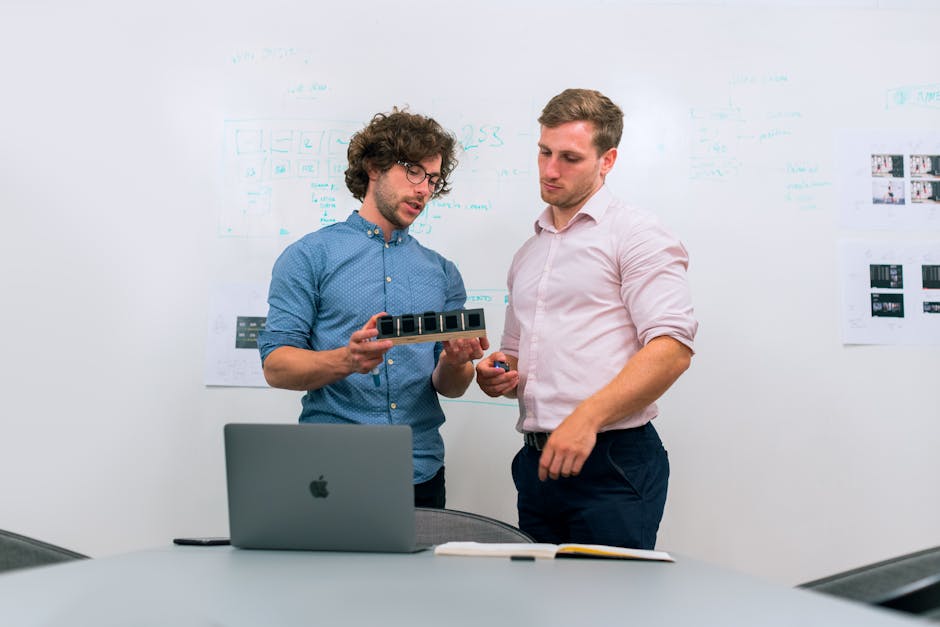Harnessing Manchester’S Tech Boom Through MVP Development
In the bustling city of Manchester, a tech boom is underway, and you have the opportunity to harness its power through MVP development. Like a conductor leading an orchestra, you can guide your start-up towards success by embracing this innovative approach.
But what exactly is MVP development? It’s the art of building a minimum viable product – a scaled-down version of your idea that allows for quick testing and iteration. By adopting this method, you can reduce time-to-market and minimise risks while gathering valuable user feedback.
The advantages are clear: shorter development cycles, cost savings, and higher chances of market acceptance. With Manchester’s thriving tech scene as your backdrop, now is the perfect time to implement these strategies for successful MVP development.
Throughout this article, we will explore real case studies of local start-ups who have mastered this approach and soared to new heights. So buckle up and get ready to ride the wave of Manchester’s tech boom – with MVP development as your compass, success awaits!
Key Takeaways
- Manchester’s tech scene is expanding and attracting entrepreneurs from around the world.
- MVP development in Manchester’s tech boom focuses on core features and allows for iterative improvements based on user feedback.
- Successful MVP development minimises risks and enables faster time-to-market for Manchester start-ups.
- Manchester’s tech industry offers future opportunities for entrepreneurs in emerging fields like AI, blockchain, AR, and VR.
The Growing Tech Scene in Manchester

The tech scene in Manchester is rapidly expanding, with start-ups and established companies alike harnessing the city’s vibrant ecosystem to drive innovation and growth.
In recent years, Manchester has emerged as a thriving hub for tech start-ups, attracting entrepreneurs from all over the world who are drawn to its supportive business environment and access to top talent.
One of the key factors contributing to Manchester’s growing tech scene is its innovation ecosystem. The city boasts a strong network of universities, research institutions, and incubators that provide support and resources for budding entrepreneurs. This collaborative environment encourages knowledge sharing and facilitates the development of new ideas.
In addition to this, Manchester offers a lower cost of living compared to other major tech hubs like London. This affordability factor makes it an attractive destination for start-ups looking to establish themselves without breaking the bank. The availability of affordable office spaces and living accommodations allows companies to allocate more resources towards their core operations.
Furthermore, Manchester benefits from its geographical location within close proximity to other major cities in the UK such as Liverpool and Leeds. This connectivity helps foster collaboration between different tech communities, leading to cross-pollination of ideas and increased opportunities for partnerships.
Understanding minimum viable product (MVP) development is crucial for start-ups looking to make their mark in Manchester’s tech scene. By focussing on developing an MVP, entrepreneurs can quickly validate their ideas in the market while minimising costs and risks. This approach allows them to gather valuable user feedback early on, which can then be used to iterate and improve their products or services.
As we delve deeper into understanding MVP development, it becomes clear how this strategy can help start-ups thrive in Manchester’s booming tech landscape.
Understanding Minimum Viable Product (MVP) Development

Imagine you’re diving headfirst into the world of building a product, starting with the essential concept and refining it until it becomes an irresistible solution. This is the essence of the Minimum Viable Product (MVP) development process.
MVP is a strategy that allows you to build a basic version of your product with just enough features to satisfy early adopters. It involves following a systematic approach that helps you test and validate your idea before investing significant time and resources into developing a fully-featured product.
To better understand the MVP development process, here are three key steps:
-
Identify the core problem: Start by identifying the main problem your product aims to solve. This will help you define the essential features required in your MVP.
-
Build minimal functionality: Develop only the minimum set of features necessary to address the identified problem. Keep it simple, focussing on providing value to users without unnecessary complexity.
-
Gather user feedback: Once your MVP is ready, release it to a small group of users and collect their feedback. This step is crucial as it allows you to gather insights and make informed decisions about further development iterations.
The benefits of adopting an MVP approach are numerous:
-
Reduced risk: By validating your idea early on, you minimise the risk of developing a product that doesn’t meet market needs or fails altogether.
-
Faster time-to-market: Building an MVP allows you to launch quickly and gain valuable insights while saving time compared to developing a fully-featured product from scratch.
-
Cost-effective: Developing an MVP requires fewer resources upfront, enabling you to allocate funds more efficiently during initial stages.
By embracing an MVP development process in this tech boom era, businesses can leverage its advantages and stay ahead in the competitive landscape without compromising innovation or quality.
Advantages of MVP Development in a Tech Boom

In the midst of a technology revolution, businesses are empowered to embrace an MVP approach and unlock the full potential of their innovative solutions. The advantages of MVP development in a tech boom are numerous, making it a cost-effective start-up strategy that allows companies to rapidly prototype their ideas.
Firstly, MVP development is cost-effective because it focuses on building only the core features necessary for initial launch. By prioritising essential functionalities and excluding non-essential ones, businesses can save time and money during the development process. This lean approach helps allocate resources efficiently, ensuring that limited funds are utilised effectively to create a viable product.
Additionally, rapid prototyping is another advantage of MVP development in a tech boom. With technological advancements continuously evolving, businesses need to act quickly to stay competitive. By adopting an agile methodology and releasing an MVP early on, companies can gather valuable user feedback and make iterative improvements based on real-world testing. This not only reduces the risk of investing in unproven ideas but also enables businesses to adapt and pivot according to market demands.
Embracing MVP development during Manchester’s tech boom offers several advantages for start-ups. It provides a cost-effective way to bring innovative ideas to market by focussing on core features while excluding unnecessary complexities. Furthermore, rapid prototyping allows businesses to iterate quickly based on user feedback, ensuring that their products meet customer needs effectively.
These advantages set the stage for successful MVP development strategies that will be explored further in the subsequent section about strategies for successful MVP development – without missing any crucial steps.
Strategies for Successful MVP Development

To ensure a successful MVP development, it’s crucial to adopt a proactive approach and leverage the saying ‘measure twice, cut once’ by carefully planning and validating each step of the process.
One effective strategy is to embrace an agile approach, which emphasises flexibility and responsiveness throughout the development cycle. This means breaking down the project into smaller, manageable tasks or iterations that can be quickly executed and validated. By continuously testing and iterating on the product based on user feedback, you can ensure that you are building something that truly meets market needs.
Market validation is another key aspect of successful MVP development. Before launching your minimum viable product, it’s important to gather data and insights from potential customers or target users. Conducting surveys, interviews, or even beta testing with a small group can help validate assumptions about your target audience’s needs and preferences. This iterative feedback loop allows you to make informed decisions about what features or functionalities should be prioritised in subsequent iterations.
By adopting an agile approach and incorporating market validation techniques into your MVP development process, you can increase the likelihood of creating a successful product that resonates with users. These strategies not only minimise risks associated with developing a full-scale product without proper validation but also enable faster time-to-market for Manchester start-ups looking to capitalise on the city’s tech boom.
In the subsequent section about ‘case studies: Manchester start-ups harnessing MVP development,’ we will explore real-world examples of companies in Manchester that have leveraged these strategies to achieve success in their respective industries.
Case Studies: Manchester Start-ups Harnessing MVP Development

Get ready to be inspired by real-life success stories of start-ups in Manchester that have utilised the power of MVP development to achieve remarkable results in their industries. These case studies showcase the benefits and potential of MVP development for aspiring entrepreneurs.
One such success story is Company X, a Manchester-based start-up that used MVP development to launch its innovative mobile app. By focussing on developing a minimum viable product with core features, Company X was able to quickly test market demand and gather user feedback. This allowed them to make necessary improvements and iterate rapidly, resulting in a highly successful app that gained traction amongst users and investors.
Another inspiring example is Company Y, a tech start-up specialising in e-commerce solutions. Through MVP development, they were able to build an initial version of their platform with essential functionalities, enabling them to attract early customers and secure funding. With each iteration, they incorporated user feedback and enhanced their product offering, eventually becoming one of the leading e-commerce platforms in Manchester.
These case studies demonstrate the advantages of MVP development for start-ups in Manchester. By focussing on delivering a minimum viable product that meets the core needs of their target audience, start-ups can accelerate time-to-market, reduce costs, and gain crucial insights from user feedback early on.
As we look towards future opportunities in Manchester’s tech industry, these success stories serve as inspiration for aspiring entrepreneurs. The use of MVP development has proven its effectiveness in helping start-ups navigate the competitive landscape and achieve significant growth. By embracing this approach and leveraging Manchester’s thriving tech ecosystem, there are endless possibilities for new ventures to emerge and make a mark on the city’s technology sector without missing out on any potential opportunities for growth or innovation.
Future Opportunities in Manchester’s Tech Industry

Excitingly, the future of Manchester’s tech industry holds boundless opportunities for aspiring entrepreneurs to revolutionise and dominate their respective sectors. With the city’s continued growth as a technology hub, the demand for skilled professionals in various emerging fields is on the rise. This opens up a plethora of future job prospects for those looking to make their mark in this thriving industry.
One area that presents exciting possibilities is artificial intelligence (AI). As AI continues to advance at an unprecedented pace, there’s a growing need for individuals who can develop and implement innovative AI solutions across various industries. From healthcare to finance, AI has the potential to transform how businesses operate and deliver services.
Another promising field on the horizon is blockchain technology. With its decentralised nature and enhanced security features, blockchain has gained traction in sectors such as finance, supply chain management, and even voting systems. As more companies recognise the value of blockchain in streamlining processes and ensuring transparency, there will be an increasing demand for skilled professionals with expertise in this area.
Additionally, Manchester’s tech industry is likely to witness significant growth in augmented reality (AR) and virtual reality (VR). These immersive technologies have already made waves in gaming and entertainment but are now being explored for applications in fields like education, healthcare, and architecture. As AR and VR continue to evolve and become more accessible, there will be ample opportunities for entrepreneurs to create groundbreaking experiences that revolutionise these industries.
Manchester’s tech industry offers an abundance of future opportunities for aspiring entrepreneurs. Whether it’s through advancements in AI, blockchain technology, or immersive technologies like AR/VR, there are numerous emerging fields where innovation can thrive. By staying abreast of these trends and acquiring relevant skills, individuals can position themselves at the forefront of Manchester’s vibrant tech scene.
Frequently Asked Questions
What is the current state of the tech scene in Manchester and how has it evolved over the years?
The tech scene in Manchester has experienced significant growth and evolution over the years. It has become a thriving hub for technology companies, leading to increased job opportunities and a boost to the city’s economy.
Can you provide examples of successful companies in Manchester that have utilised MVP development to their advantage?
Successful companies in Manchester that have utilised MVP development to their advantage include On the Beach, Push Doctor, and Peak. These companies have effectively leveraged this approach to rapidly launch and iterate their products, achieving significant success in the tech industry.
What are some common challenges faced during MVP development and how can they be overcome?
To overcome challenges in MVP development, you can focus on clear communication and collaboration amongst team members. Implementing agile methodologies and conducting regular user testing can also help ensure successful implementation of your MVP.
Are there any specific industries or sectors in Manchester’s tech industry that are particularly booming?
Specific booming industries in Manchester’s tech industry include fintech, e-commerce, digital marketing, and cybersecurity. The tech scene in Manchester has evolved over the years, attracting start-ups and established companies alike, contributing to its thriving ecosystem.
How can individuals and start-ups in Manchester tap into the future opportunities and growth potential of the city’s tech industry?
To tap into future opportunities in Manchester’s tech industry, individuals and start-ups can engage with innovation hubs like the Sharp Project. By actively participating in the tech community, they can access resources, networking opportunities, and collaboration potential for growth.
Conclusion
In conclusion, harnessing MVP development in Manchester’s booming tech scene can lead to significant advantages for start-ups. By focussing on creating a minimum viable product, companies can quickly test their ideas and gather valuable user feedback.
This approach allows for efficient resource allocation and reduces the risk of failure. The case studies of successful start-ups in Manchester highlight the potential for growth and innovation in the city’s tech industry.
With future opportunities on the horizon, who knows what groundbreaking technologies will emerge from this vibrant tech hub?
Contact us to discuss our services now!
